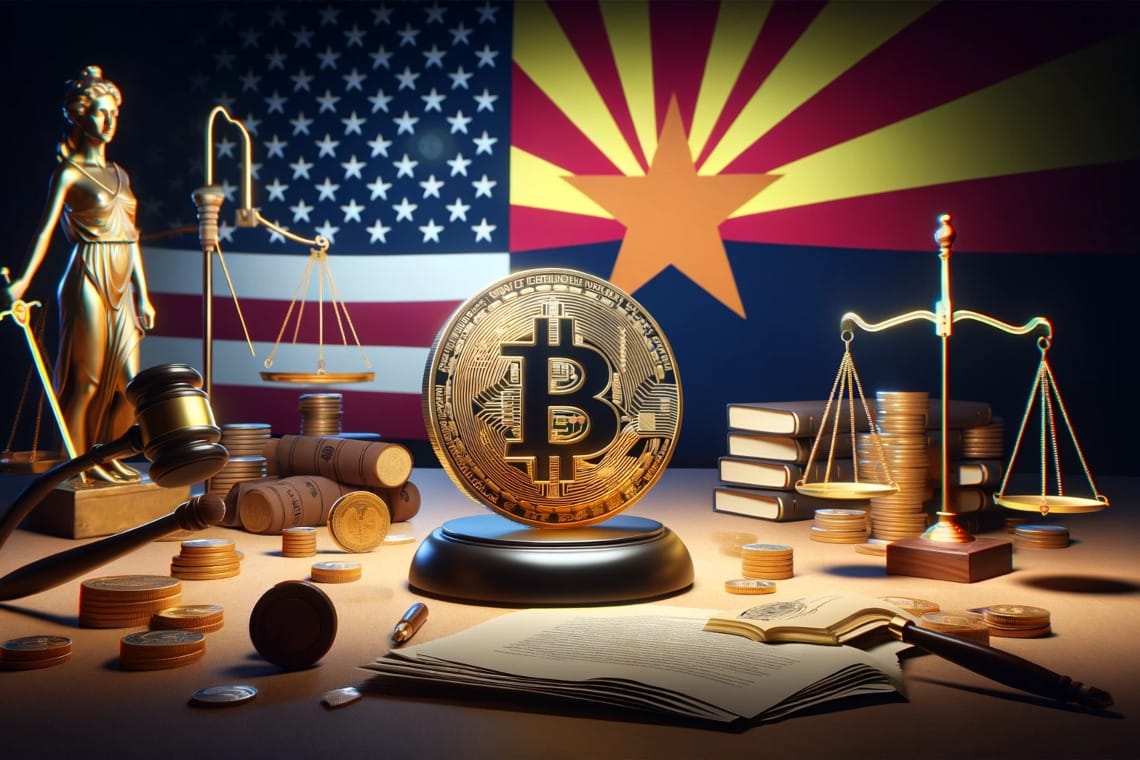
Yesterday, decidedly positive news arrived from the State of Arizona regarding Bitcoin ETFs.
In fact, some senators have introduced a resolution to ask the state pension system to consider adding Bitcoin ETFs to their portfolio.
Bitcoin ETF news: The resolution presented to the Arizona Senate
HCR 2041 was introduced yesterday in the Arizona Senate by Senators Smith, Biasiucci, Carbone, Carter, Chaplik, Dunn, Gillette, Gress, Heap, Hendrix, Jones, Kolodin, Marshall, Martinez, Montenegro, Parker B, Payne and Wadsack.
The Arizona State Senate is made up of 30 senators with a Republican majority. The senators who introduced resolution HCR 2041 belong to the majority.
The resolution is expressly titled “supporting the potential use of digital assets by the Arizona State Retirement System and the Public Safety Personnel Retirement System,” and refers directly to Bitcoin ETFs.
Technically it simply asks that members of the legislature encourage the Arizona State Retirement System (ASRS) and the Public Safety Personnel Retirement System to consider the implications of including a digital asset ETF in their portfolios of investment.
It also calls for developments in Bitcoin ETFs and other digital asset ETFs to be closely monitored, and for a report to be submitted on the feasibility, risks and potential benefits of directing a portion of state pension system funds to ETFs on digital assets.
In other words, the Arizona senators are asking that the state pension system also consider investing in Bitcoin ETFs.
The electoral campaign
However, it should be remembered that the USA is in the midst of an electoral campaign in 2024, given that the presidential elections will be held in November.
It is now clear that cryptocurrencies will be an integral part of the electoral campaign, and given that the HCR 2041 resolution actually only asks to evaluate potential future ASRS investments in new Bitcoin ETFs, this could also be a primarily propaganda initiative.
However, there is a concrete basis of truth behind this initiative, given that Bitcoin is in all respects a financial instrument that can prove useful to pension funds.
In fact, pension funds accumulate fiat money over time thanks to payments from workers, but then they have to keep it in cash for a long time before giving it back to workers when they retire.
Due to inflation, pension funds have the difficult task of avoiding or minimizing the loss of real value of the funds they hold on behalf of the workers who pay them contributions, and they do so by investing that money rather than simply to guard it.
Given that Bitcoin is a financial instrument that allows you to protect yourself from excessively expansionary monetary policies of central banks that produce excess inflation, it is actually logical that pension funds take it into consideration as a potential investment.
However, since it is a risk-on asset, unlike gold for example, they need to make their assessments well, and obviously take into consideration the possibility of investing only a minimal part of the funds they manage in it.
So while Resolution HCR 2041 presented by Arizona senators may be primarily a propaganda initiative, it may have a solid grain of truth.
Bitcoin ETFs
However, it is no coincidence that Bitcoin ETFs are specifically mentioned in that resolution, nor that it was presented only in 2024.
For purely legal reasons, pension funds cannot invest their funds at will.
They have limitations that serve to prevent anyone from using those funds to speculate on high-risk assets, and among these there is one that prevents them from investing in unregulated financial products.
Cryptocurrencies in the USA are still unregulated financial assets today, while for example in the EU they now are, but ETFs are in all respects more than regulated assets. Indeed, pension funds already invest extensively in ETFs.
Therefore, the arrival of BTC ETFs on the US markets finally makes it possible for pension funds to invest part of their funds in Bitcoin, albeit indirectly.
It should be remembered that spot Bitcoin ETFs are directly and completely collateralized in BTC, so buying shares of a spot Bitcoin ETF on the market is equivalent to buying BTC.
This also means that such purchases affect the price of Bitcoin, although only indirectly.
The words of the Arizona senators hit the latest news on spot Bitcoin ETFs
One thing that may be very surprising to those who do not follow the evolution of Bitcoin is what the Arizona senators wrote in the HCR 2041 resolution.
In fact, they have put in black and white in an official state policy document that they believe that the financial investment landscape is rapidly evolving, thanks to the advent of digital assets such as Bitcoin.
After adding that digital assets like Bitcoin have also gained considerable interest in the world of ETFs, they write that there are already large pension funds that have invested in Bitcoin ETFs.
They also explicitly specify that the US central government holds approximately 200,000 BTC, thus making it clear that US state entities have the full right to hold Bitcoin.
Obviously they also underlined the risks of such an investment, on the other hand the state pension system has the primary obligation to try to keep at least unchanged the real value of the funds it manages, without generating losses.
If this initiative goes forward after the elections, it could pave the way for Bitcoin’s entry into the pension fund sector, which would open a new era for Bitcoin itself.
Source: https://cryptonomist.ch/2024/03/07/ottime-news-arizona-etf-bitcoin/

